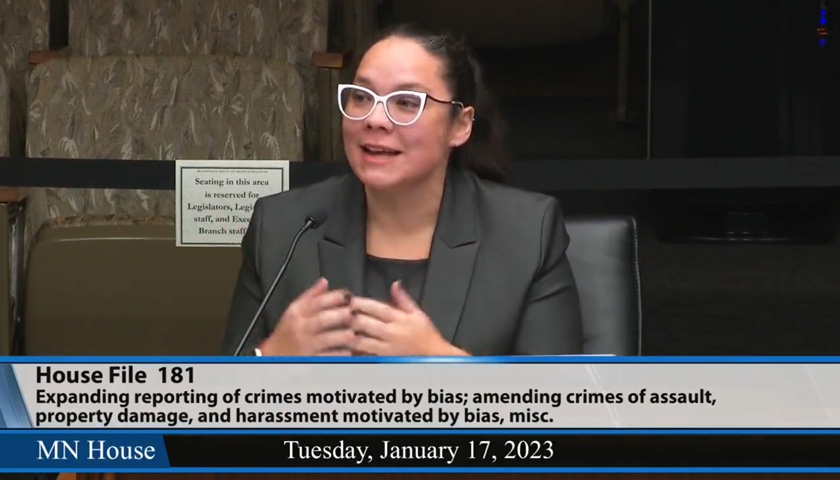by Evan Stambaugh
One Minnesota lawmaker is voicing his concerns about a proposed bill he says would allow the state government to keep track of “bias” incidents and “hate speech” in which no crime may have been committed.
On Tuesday the Minnesota House of Representatives’ Public Safety Finance and Policy Committee held a hearing on HF 181, a bill introduced Jan. 9 that proposes an expansion of reporting “crimes motivated by bias,” an update in peace officer training standards, and the appropriate funding thereto.
All 19 sponsors of HF 181 are Democrats.
At the hearing Rep. Walter Hudson, a freshman Republican legislator from Albertville, expressed his reservations about the intent of HF 181. He claimed that the bill would allow the Minnesota Department of Human Rights to “create a database of incidents that have no objective standard determining whether or not they violated the law, whether or not they had anything distinct from just normal speech.”
“So if someone were to post on social media a particular Bible verse that defined marriage or spoke of God’s institution of marriage as being between one man and one woman, or a Bible verse that spoke in condemning terms regarding certain sexual proclivities, would that posting of a Bible verse be considered an incident reportable under your bill?” he asked Democrat Rep. Samantha Vang, one of the bill’s primary authors.
This week, Public Safety heard HF 181. It creates a mechanism within the Department of Human Rights for reporting "incidents that may not be criminal" but may represent "actual or perceived" bias.
I asked the author whether a bible verse was a reportable incident.
1/8 pic.twitter.com/KpbzsyNbTu
— Walter Hudson (@WalterHudson) January 18, 2023
Vang, however, only responded to Hudson’s concern by saying there is an “increased need” to “document and accurately know what’s happening in our communities.”
“It is important to let our community know that we do not tolerate hate and bias incidents in this community and in Minnesota, and we support communities that [have] been harassed, intimidated, and abused,” she said.
In a Twitter thread posted Wednesday with clips from the hearing, Hudson criticized Department of Human Rights Commissioner Rebecca Lucero and defenders of HF 181 over their vague answers as to why “bias-motivated incidents” should be “documented and tracked” by a state government agency.
“But we know what it’s for,” he tweeted. “It’s to manufacture legitimacy around the narrative of ‘hate’ as a growing problem and lobby further government action. We should not be policing, tracking, or documenting speech.”
In their comments defending the bill, Lucero and Vang both cited “derogatory” remarks towards people of Asian descent during the height of the COVID pandemic. Although such remarks without criminal intent are not prosecutable offenses, the two stated that the targets and their community are nevertheless deeply affected by them.
“We’re just looking to have a better understanding of what is likely going on out there, so that you can know, ‘Hey, this is what’s going on in my community.’ It’s helpful to know,” Lucero added.
Summing it up, Commissioner Lucero confirms that there is no objective standard for determining what constitutes "hate speech," but suggests we should have government documented incident reports anyway "so that you can know what is going on in your community."
7/8 pic.twitter.com/Ch1Tb8iG4b
— Walter Hudson (@WalterHudson) January 18, 2023
– – –
Evan Stambaugh is a freelance writer who had previously been a sports blogger. He has a BA in theology and an MA in philosophy.
Photo “Rebecca Lucero” by Walter Hudson.




